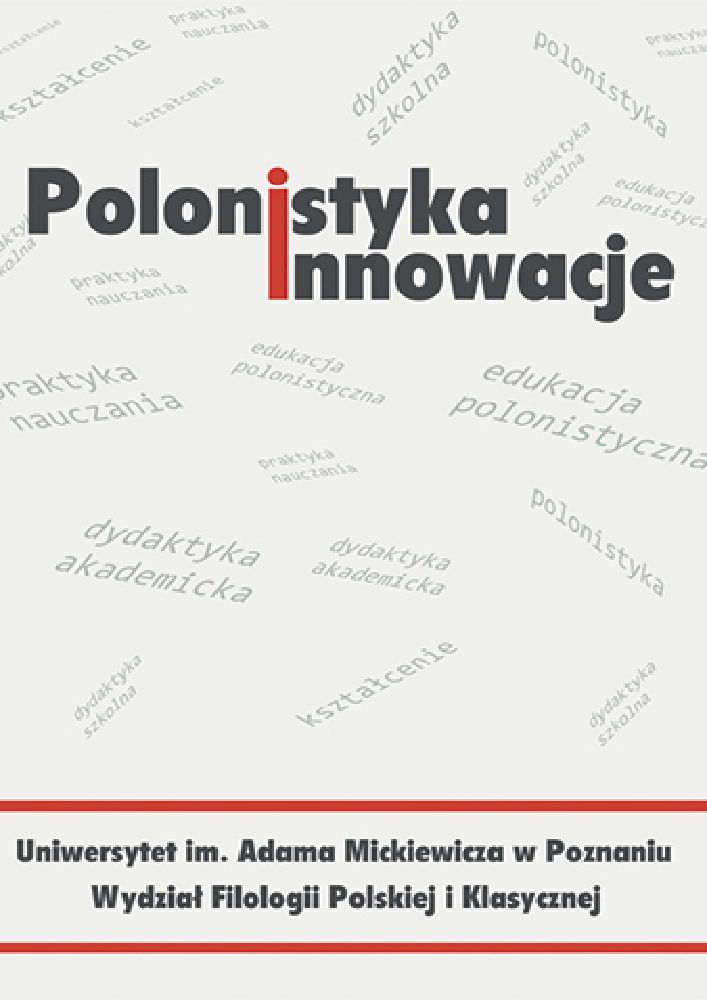Abstract
It is often complicated to understand the concept of Polish studies abroad. The author presents Polish Studies in the capital of Europe. In this Article the case of the French-speaking Free University of Brussels (ULB) is discussed. The author introduces Polish Studies as a part of Slavic Studies, then develops the limitations that this issue has on the program of teaching. The writer profiles the heterogeneity of the students: showing their differences resulting from their origins, backgrounds of knowledge, and the presence of multiculturalism. Then, the study program is explained, as well as the means and solutions facilitating the simultaneous teaching of language and literature Among the solutions are propounded new technologies, stays abroad and encounters with native speakers. In conclusion, the author outlines foreign student’s learning process in Brussels and the teaching difficulties that academic teachers may encounter in European faculties. She provides remedies found to overcome these educational issues.
References
Banach Małgorzata, Bucko Dominika, 2019, Rozumienie tekstu pisanego w języku obcym na przykładzie języka polskiego jako obcego, „Glottodydaktyka”, t. 19.
Baran Marzena, 2015, Dydaktyka kultury a podejście ukierunkowane na działanie w nauczaniu języka polskiego jako obcego, „Postscriptum Polonistyczne”, nr 2 (16).
Carter Ronald, 1986, Linguistic Models, Language and Literarines: Study Strategies in the Teaching of Literature to Foreign Students, w: “Literature and language teaching”, Brumfit Ch., Carter R. (red.), Oxford University Press, s. 110–132.
CEFR, 2001, Common European framework of reference for language: learning, teaching, assessments, Cambridge University Press.
Chun Dorothy, Kern Richard, Smith Bryan, 2016, Technology in Language Use, Language Teaching, and Language, w: “The Modern Language Journal”, vol. 100, Supplement, s. 64-80.
Czerkies Tamara, 2008, Rozwijanie kompetencji literackiej – teksty prozatorskie na zajęciach języka polskiego jako obcego, w: W poszukiwaniu nowych rozwiązań. Dydaktyka języka polskiego jako obcego u progu XXI wieku, Miodunka W., Seretny A. (red.), Kraków, s. 255-263.
Cyzman Marzenna, 2011, Czego jeszcze nie wiemy o nauczaniu literatury polskiej?: tekst literacki na lekcji języka polskiego jako obcego, „Teraźniejszość – Człowiek – Edukacja: Kwartalnik Myśli Społeczno-Pedagogicznej”, nr 4 (56), s. 91-101.
Dakowska Maria, 2005, Teaching English as a foreign language. A guide for professionals, Warszawa.
Gałan Beata, 2017, La méthode d’enseignement à distance dans le développement de la compétence rédactionnelle en langue étrangère, Katowice.
Garncarek Piotr, 1997, Świat języka polskiego oczami cudzoziemców, Warszawa.
Gębal Przemysław, 2010, Dydaktyka kultury polskiej w kształceniu językowym cudzoziemców, Kraków.
Głowiński Michał, Okopień-Sławińska Aleksandra, Sławiński Janusz, 1967, Zarys teorii literatury, Warszawa.
Gregory Josie, 2002, Facilitation and facilitator style, w: “The theory and practice of teaching”, Peter J. (red.), London, s. 79–93.
Jakobson Roman, 1987, Language in Literature, (ed.) by Krystyna Pomorska and Stephen Rudy, The Belknap Press of Harvard University press Cambridge, Massachusetts, London, England.
Jelonkiewicz Mirosław, 2008, Film jako tekst kultury w komunikacji interkulturowej (wykorzystanie filmów w nauczaniu cudzoziemców wiedzy o Polsce i jej kulturze), „Postscriptum Polonistyczne”, nr 2(2).
Karcz Andrzej, 2014, Littérature polonaise comme littérature étrangère et son enseignement, w : Enseigner et apprendre le polonais langue étrangère, Centre de civilisation polonaise de l’Université Paris-Sorbonne et Centre d’enseignement de polonais langue étrangère Université de Varsovie.
Kosch Natalie, 2019, What role do electronic resources play in learning Polish as a foreign/second language? The results of a survey, “Kształcenie Polonistyczne Cudzoziemców”, Acta Universitatis Lodziensis, vol. 26, Article 11.
Kowalewski Jerzy, 2008, Nauczanie kultury polskiej jako obcej – stan obecny: próba polemiki, „Postscriptum Polonistyczne”, nr 2(2), 159-175.
Michułka Dorota, 2008, Baśń jako tekst w nauczaniu obcokrajowców – „Waligóra i Wyrwidąb” Kazimierza Władysława Wójcickiego, w: „Kształcenie Polonistyczne Cudzoziemców”, Acta Universitatis Lodziensis 16, s. 199-205.
Miodunka Władysław T., 2010, Polszczyzna jako język drugi. Definicja języka drugiego, Kraków.
Miodunka Władysław, 1985, Recent changes in methods of teaching Polish as a foreign language, Reed J. (przeł.) w: “The Polish Review”, vol. 30, No. 4, s. 397-404.
Miłosz Czesław, 1986, Histoire de la littérature, Paris, Fayard.
Nuttall Christine, 1982, Teaching reading skills in a foreign language, Heinemann, Oxford.
Seretny Anna, 2011, Kompetencja leksykalna uczących się języka polskiego jako obcego w świetle badań ilościowych, Kraków.
Seretny Anna, 2013, Czytanie ekstensywne, czyli sposób na efektywne rozwijanie kompetencji leksykalnej uczących się, w: Sztuka to rzemiosło. Nauczyć Polski i polskiego, t. 3, Tambor J., Achtelik A. (red.), Katowice, s. 208-220.
Słownik terminów literackich, 1998, Sławiński J. (red.), Wrocław.
Stankiewicz Katarzyna, Żurek Anna, 2011, Międzykulturowe uczenie się na kursie języka polskiego jako obcego, Koutny I., Nowak P. (red.), w: „Język. Komunikacja. Informacja”, nr 6, s. 187-194.
Szulc Aleksander, 1984, Podręczny słownik językoznawstwa stosowanego, Warszawa.
Świstowska Małgorzata, 2009, Obecność tekstów prozy polskiej po 1989 roku i strategie ich czytania w nauczaniu języka polskiego jako obcego, Annales Universitatis Paedagogicae Cracoviensis Studia Historicolitteraria IX.
Włodarczyk Hélène, 2014, Mot d’ouverture: de la linguistique théorique à l’enseignement du polonais langue étrangère, w: Enseigner et apprendre le polonais langue étrangère, Centre de civilisation polonaise de l’Université Paris-Sorbonne et Centre d’enseignement de polonais langue étrangère Université de Varsovie.

